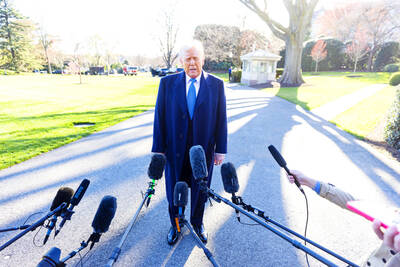Two academics on Wednesday criticized the German media’s coverage of Chinese news as shallow, but a former German TV correspondent rejected the claims in a debate at the Frankfurt Book Fair.
“They create the impression among German people that any dissident point of view in China is instantly suppressed,” said Thomas Heberer, a political science professor and China specialist at Duisburg University. “That’s the bias.”
Heberer said that hearing about biased and shallow reporting had prompted ordinary Chinese to feel solidarity with the government last year and thus increased the sense of legitimacy of the political elite.
SELECTIVE
“The main problem is that the media are highly selective,” said the other professor, Kai Hafez of Germany’s Erfurt University.
“They don’t report day-to-day politics, but sensational oddities,” he said.
Describing his analysis of reports during unrest in Tibet and the Olympic Games last year, he appealed to German correspondents to interview more ordinary Chinese instead of always calling the same experts, human rights activists or dissidents.
Stefan Niemann, a former Beijing correspondent for ARD public television, rejected the charges, saying reporters for German newspapers and broadcasters were no less fair in China than anywhere else.
“Putting a focus on human rights issues during the Olympic Games was appropriate,” he said.
INTIMIDATION
He said people who spoke to correspondents were often intimidated later by Chinese secret police.
The debate was organized by the Heinrich Boell Foundation, a think tank associated with the German Greens party.
The Berlin foundation commissioned the analysis by Heberer, Hafez and others, using 9,000 reports in German about China last year. A report is to be published at the start of next year.

DEATH CONSTANTLY LOOMING: Decades of detention took a major toll on Iwao Hakamada’s mental health, his lawyers describing him as ‘living in a world of fantasy’ A Japanese man wrongly convicted of murder who was the world’s longest-serving death row inmate has been awarded US$1.44 million in compensation, an official said yesterday. The payout represents ¥12,500 (US$83) for each day of the more than four decades that Iwao Hakamada spent in detention, most of it on death row when each day could have been his last. It is a record for compensation of this kind, Japanese media said. The former boxer, now 89, was exonerated last year of a 1966 quadruple murder after a tireless campaign by his sister and others. The case sparked scrutiny of the justice system in

DITCH TACTICS: Kenyan officers were on their way to rescue Haitian police stuck in a ditch suspected to have been deliberately dug by Haitian gang members A Kenyan policeman deployed in Haiti has gone missing after violent gangs attacked a group of officers on a rescue mission, a UN-backed multinational security mission said in a statement yesterday. The Kenyan officers on Tuesday were on their way to rescue Haitian police stuck in a ditch “suspected to have been deliberately dug by gangs,” the statement said, adding that “specialized teams have been deployed” to search for the missing officer. Local media outlets in Haiti reported that the officer had been killed and videos of a lifeless man clothed in Kenyan uniform were shared on social media. Gang violence has left

‘HUMAN NEGLIGENCE’: The fire is believed to have been caused by someone who was visiting an ancestral grave and accidentally started the blaze, the acting president said Deadly wildfires in South Korea worsened overnight, officials said yesterday, as dry, windy weather hampered efforts to contain one of the nation’s worst-ever fire outbreaks. More than a dozen different blazes broke out over the weekend, with Acting South Korean Interior and Safety Minister Ko Ki-dong reporting thousands of hectares burned and four people killed. “The wildfires have so far affected about 14,694 hectares, with damage continuing to grow,” Ko said. The extent of damage would make the fires collectively the third-largest in South Korea’s history. The largest was an April 2000 blaze that scorched 23,913 hectares across the east coast. More than 3,000

‘INCREDIBLY TROUBLESOME’: Hours after a judge questioned the legality of invoking a wartime power to deport immigrants, the president denied signing the proclamation The US on Friday said it was terminating the legal status of hundreds of thousands of immigrants, giving them weeks to leave the country. US President Donald Trump has pledged to carry out the largest deportation campaign in US history and curb immigration, mainly from Latin American nations. The order affects about 532,000 Cubans, Haitians, Nicaraguans and Venezuelans who came to the US under a scheme launched in October 2022 by Trump’s predecessor, Joe Biden, and expanded in January the following year. They would lose their legal protection 30 days after the US Department of Homeland Security’s order is published in the Federal